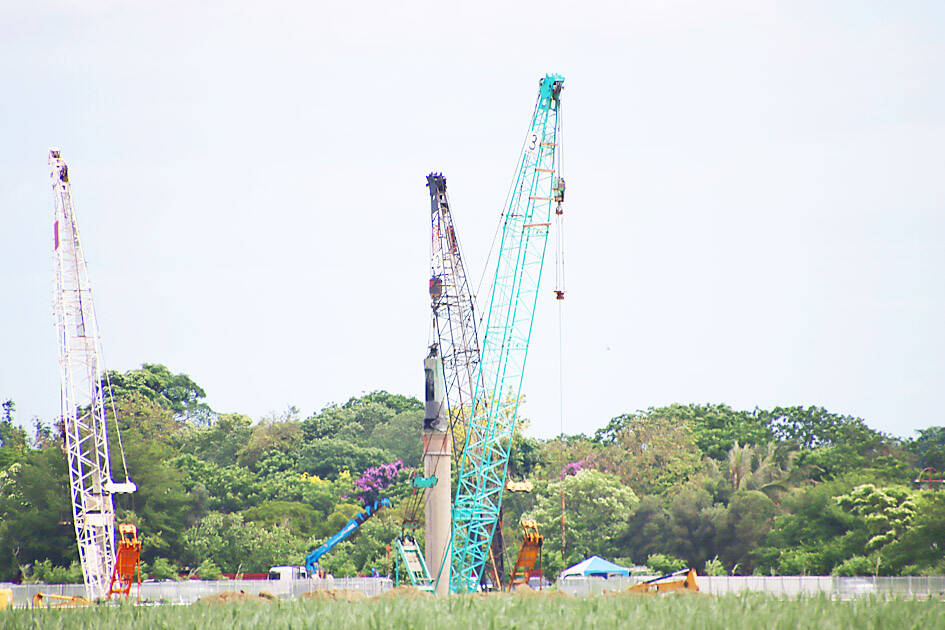Construction of a Taiwan Semiconductor Manufacturing Co (TSMC, 台積電) packaging plant in Chiayi County has been halted following the discovery of suspected archeological ruins, local authorities said on Monday.
The discovery was made at the end of last month, during construction of the first of two planned packaging plants using sophisticated chip-on-wafer-on-substrate (CoWoS) technology at the Chiayi Science Park (嘉義科學園區) — the Chiayi section of the Southern Taiwan Science Park (南部科學園區).
Construction on the plant only began last month, and it was scheduled to begin production in 2028.

Photo: Lin Yi-chang, Taipei Times
In accordance with the Cultural Heritage Preservation Act (文化資產保存法), a review committee convened early this year and decided to halt construction of the fab while preservation plans are made.
A TSMC spokesperson on Monday said that the firm would comply with the law and authorities.
The Southern Taiwan Science Park Bureau said that it would assist TSMC in addressing the change of plans.
Construction of the second advanced packaging plant in Chiayi is being planned to ensure that construction schedules are not seriously affected, it said.
The review committee decided that all future development projects should be monitored, the Chiayi County Cultural and Tourism Bureau said.

Shiina Ito has had fewer Chinese customers at her Tokyo jewelry shop since Beijing issued a travel warning in the wake of a diplomatic spat, but she said she was not concerned. A souring of Tokyo-Beijing relations this month, following remarks by Japanese Prime Minister Sanae Takaichi about Taiwan, has fueled concerns about the impact on the ritzy boutiques, noodle joints and hotels where holidaymakers spend their cash. However, businesses in Tokyo largely shrugged off any anxiety. “Since there are fewer Chinese customers, it’s become a bit easier for Japanese shoppers to visit, so our sales haven’t really dropped,” Ito

The number of Taiwanese working in the US rose to a record high of 137,000 last year, driven largely by Taiwan Semiconductor Manufacturing Co’s (TSMC, 台積電) rapid overseas expansion, according to government data released yesterday. A total of 666,000 Taiwanese nationals were employed abroad last year, an increase of 45,000 from 2023 and the highest level since the COVID-19 pandemic, data from the Directorate-General of Budget, Accounting and Statistics (DGBAS) showed. Overseas employment had steadily increased between 2009 and 2019, peaking at 739,000, before plunging to 319,000 in 2021 amid US-China trade tensions, global supply chain shifts, reshoring by Taiwanese companies and

Taiwan Semiconductor Manufacturing Co (TSMC, 台積電) received about NT$147 billion (US$4.71 billion) in subsidies from the US, Japanese, German and Chinese governments over the past two years for its global expansion. Financial data compiled by the world’s largest contract chipmaker showed the company secured NT$4.77 billion in subsidies from the governments in the third quarter, bringing the total for the first three quarters of the year to about NT$71.9 billion. Along with the NT$75.16 billion in financial aid TSMC received last year, the chipmaker obtained NT$147 billion in subsidies in almost two years, the data showed. The subsidies received by its subsidiaries —

Taiwan Semiconductor Manufacturing Co (TSMC) Chairman C.C. Wei (魏哲家) and the company’s former chairman, Mark Liu (劉德音), both received the Robert N. Noyce Award -- the semiconductor industry’s highest honor -- in San Jose, California, on Thursday (local time). Speaking at the award event, Liu, who retired last year, expressed gratitude to his wife, his dissertation advisor at the University of California, Berkeley, his supervisors at AT&T Bell Laboratories -- where he worked on optical fiber communication systems before joining TSMC, TSMC partners, and industry colleagues. Liu said that working alongside TSMC